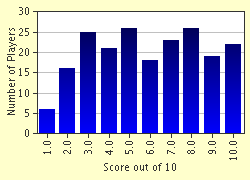Quiz Answer Key and Fun Facts
1. This famous Roman historian was very interested in writing about the history of Rome. Renowned as a great prose stylist, he wrote the 'Historiae' chronicling Roman history and its emperors from 69AD to 96AD. He also wrote 'Annales' , dealing with Roman history and the decline of Roman political freedom from 14AD to 68AD. Who is he?
2. Born the son of a farmer in a village near Mantua, this poet wrote many great works like 'Bucolica' (aka 'Eclogue'), a series of pastoral poems, and the didactic 'Georgica' (Art of Husbandry). He is best remembered however, for his unfinished epic poem 'Aeneid'. Who is he?
3. Julius Caesar was not only known as a statesman but also for his prose which set normative standards for the Latin language.
4. This Roman philosopher and writer was brought back from exile by the Empress Agrippina in order to teach her son Nero. He was an accomplished writer dealing usually with moral philosophical issues in dialogues and letters. Unfortunately, as is the case with many ungrateful students, in 65AD, he was accused of plotting to take Nero's life and forced to commit suicide. Who was he?
5. Titus Maccius Plautus was well known as a writer of comedies. He often took Greek comedies and adapted them for a Roman audience, using coarse humour with comic figures. Which of the following is NOT the work of Plautus?
6. Caius Petronius' greatest work is a Menippean satire called 'The Satyricon'.
7. This great historian devoted 142 books on the history of Rome from the foundations of Rome to the year 9BC. Often writing from a moral standpoint, his history of Rome was considered a classic in his own lifetime and has had a profound influence upon the style of historical writing down the ages. Who is he?
8. Rome has produced many wonderful poets who excelled in writing epics. Which of the following is NOT a classic Roman poet?
9. This Roman biographer and historian was Secretary of Imperial Correspondence during the reign of Hadrian but around 122AD he was fired from the post for neglecting court formality. He then turned his hand at writing biographies of famous people, among them emperors, poets and orators. One of his most important works is 'De Vita Cesarum' - dealing with emperors from Julius Caesar to Domitian. Who is he?
10. Which of the following writers was brought to Rome from Carthage as a slave but impressed his master so much that, not only was he emancipated, but he was also given a classic Roman education?
Source: Author
nerthus
This quiz was reviewed by FunTrivia editor
bloomsby before going online.
Any errors found in FunTrivia content are routinely corrected through our feedback system.


